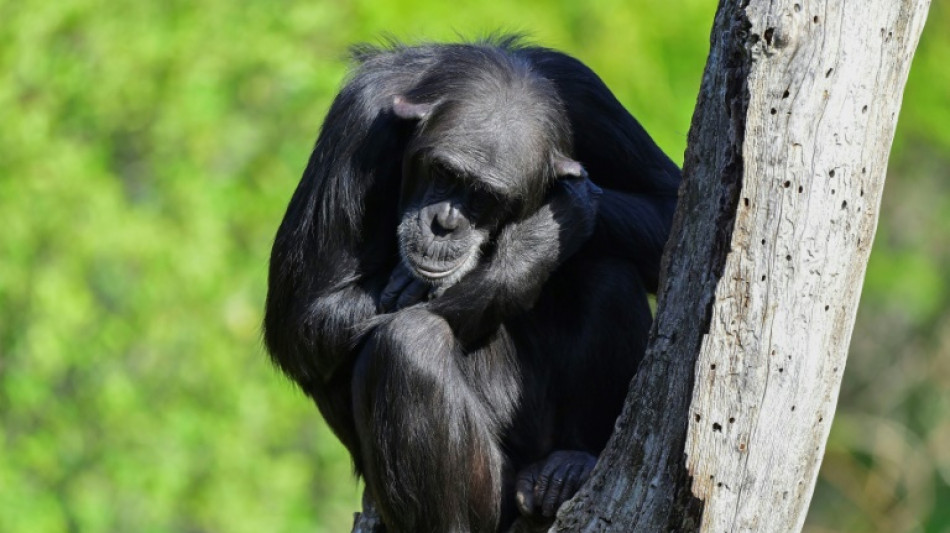
-
 Argentina beat Scotland after stunning fightback
Argentina beat Scotland after stunning fightback
-
Pope urges leaders not to leave poor behind

-
 Pressure will boost Germany in 'knockout' Slovakia clash, says Nagelsmann
Pressure will boost Germany in 'knockout' Slovakia clash, says Nagelsmann
-
Ecuador votes on hosting foreign bases as Noboa eyes more powers

-
 Portugal qualify for 2026 World Cup by thrashing Armenia
Portugal qualify for 2026 World Cup by thrashing Armenia
-
Greece to supply winter gas to war battered Ukraine

-
 India and Pakistan blind women show spirit of cricket with handshakes
India and Pakistan blind women show spirit of cricket with handshakes
-
Ukraine signs deal with Greece for winter deliveries of US gas

-
 George glad England backed-up haka response with New Zealand win
George glad England backed-up haka response with New Zealand win
-
McIlroy loses playoff but clinches seventh Race to Dubai title

-
 Ecuador votes on reforms as Noboa eyes anti-crime ramp-up
Ecuador votes on reforms as Noboa eyes anti-crime ramp-up
-
Chileans vote in elections dominated by crime, immigration

-
 Turkey seeks to host next COP as co-presidency plans falter
Turkey seeks to host next COP as co-presidency plans falter
-
Bezzecchi claims Valencia MotoGP victory in season-ender

-
 Wasim leads as Pakistan dismiss Sri Lanka for 211 in third ODI
Wasim leads as Pakistan dismiss Sri Lanka for 211 in third ODI
-
Serbia avoiding 'confiscation' of Russian shares in oil firm NIS

-
 Coach Gambhir questions 'technique and temperament' of Indian batters
Coach Gambhir questions 'technique and temperament' of Indian batters
-
Braathen wins Levi slalom for first Brazilian World Cup victory

-
 Rory McIlroy wins seventh Race to Dubai title
Rory McIlroy wins seventh Race to Dubai title
-
Samsung plans $310 bn investment to power AI expansion

-
 Harmer stars as South Africa stun India in low-scoring Test
Harmer stars as South Africa stun India in low-scoring Test
-
Mitchell ton steers New Zealand to seven-run win in first Windies ODI

-
 Harmer stars as South Africa bowl out India for 93 to win Test
Harmer stars as South Africa bowl out India for 93 to win Test
-
China authorities approve arrest of ex-abbot of Shaolin Temple

-
 Clashes erupt in Mexico City anti-crime protests, injuring 120
Clashes erupt in Mexico City anti-crime protests, injuring 120
-
India, without Gill, 10-2 at lunch chasing 124 to beat S.Africa

-
 Bavuma fifty makes India chase 124 in first Test
Bavuma fifty makes India chase 124 in first Test
-
Mitchell ton lifts New Zealand to 269-7 in first Windies ODI

-
 Ex-abbot of China's Shaolin Temple arrested for embezzlement
Ex-abbot of China's Shaolin Temple arrested for embezzlement
-
Doncic scores 41 to propel Lakers to NBA win over Bucks

-
 Colombia beats New Zealand 2-1 in friendly clash
Colombia beats New Zealand 2-1 in friendly clash
-
France's Aymoz wins Skate America men's gold as Tomono falters

-
 Gambling ads target Indonesian Meta users despite ban
Gambling ads target Indonesian Meta users despite ban
-
Joe Root: England great chases elusive century in Australia

-
 England's Archer in 'happy place', Wood 'full of energy' ahead of Ashes
England's Archer in 'happy place', Wood 'full of energy' ahead of Ashes
-
Luxury houses eye India, but barriers remain

-
 Budget coffee start-up leaves bitter taste in Berlin
Budget coffee start-up leaves bitter taste in Berlin
-
Reyna, Balogun on target for USA in 2-1 win over Paraguay

-
 Japa's Miura and Kihara capture Skate America pairs gold
Japa's Miura and Kihara capture Skate America pairs gold
-
Who can qualify for 2026 World Cup in final round of European qualifiers

-
 UK to cut protections for refugees under asylum 'overhaul'
UK to cut protections for refugees under asylum 'overhaul'
-
England's Tuchel plays down records before final World Cup qualifier

-
 Depoortere double helps France hold off spirited Fiji
Depoortere double helps France hold off spirited Fiji
-
Scotland face World Cup shootout against Denmark after Greece defeat

-
 Hansen hat-trick inspires Irish to record win over Australia
Hansen hat-trick inspires Irish to record win over Australia
-
Alcaraz secures ATP Finals showdown with 'favourite' Sinner

-
 UK to cut protections for refugees under asylum 'overhaul': govt
UK to cut protections for refugees under asylum 'overhaul': govt
-
Spain, Switzerland on World Cup brink as Belgium also made to wait

-
 Sweden's Grant leads by one at LPGA Annika tournament
Sweden's Grant leads by one at LPGA Annika tournament
-
Scotland cling to hopes of automatic World Cup qualification despite Greece defeat


Chimps are upping their tool game, says study
"Planet of the Apes" may have been onto something.
Chimpanzees are steadily honing their tool-using skills -- a process unfolding over millennia, driven by the exchange of ideas through migrations between populations, according to a new study published Thursday in Science.
The finding in chimps -- humans' closest living relatives -- holds relevance for us too, as it supports the idea that, deep in the mists of time, our own ape ancestors leveraged social connections to improve their technologies, lead author Cassandra Gunasekaram told AFP.
Scientists have long marveled at chimps' ability to pass down intricate behaviors, like tool use, from one generation to the next.
Yet while human civilization has leapt from the Stone Age to the Space Age, chimpanzee "culture" -- defined as socially learned behaviors -- seemed to have remained static.
Gunasekaram, a doctoral student at the University of Zurich, set out to challenge this assumption.
- Connections spark innovation -
She and colleagues combined genetic data tracing ancient chimpanzee migrations across Africa with observations of 15 distinct foraging behaviors across dozens of populations and the four subspecies.
These behaviors were categorized into three levels: those requiring no tools, those with simple tools, like using chewed leaves as a sponge to absorb water from tree holes, and the most complex, which involve toolsets.
One striking example of toolset use comes from Congo, where chimps use a stout stick to bore a tunnel into the ground to reach a termite nest, then modify a plant stem by chewing its tip into a brush to "fish" for termites in the tunnel they've made.
The study found that advanced tool use strongly correlated with populations connected by genetic exchanges over the last 5,000–15,000 years, suggesting such behaviors spread when groups interacted.
Areas where three subspecies overlap exhibited the most complex tool use, highlighting how cross-group connections foster cultural knowledge.
By contrast, simpler behaviors, such as foraging without tools, seemed less tied to migration and likely evolved independently in different regions.
- Foraging efficiently -
Gunasekaram said this mirrors how trading ideas and incremental innovation have been critical to human technological progress, taking us from early abacuses to modern smartphones.
"They've become so complex that one person alone could not reinvent them from scratch," she said.
But unlike humans, chimps have far fewer opportunities to encounter new individuals and ideas -- migrations occur gradually, driven by sexually mature females moving to new communities to avoid inbreeding.
Analyzing ancient genetic flows helped the team overcome one of the biggest challenges in studying the evolution of chimpanzee culture: the limited window of observation, as the species has only been researched scientifically for about a century.
What's more, "Chimpanzee tools are made of sticks and stems, which are all perishable," Gunasekaram explained, making it nearly impossible to trace how their artifacts have evolved over time.
So, will chimps one day rival human ingenuity? Hardly. But given enough time, they could become more efficient foragers.
For example, some populations are already more advanced in cracking nuts with hammers and anvils made of stone , and one particularly innovative group has even invented a stabilizer for the anvil, said Gunasekaram.
Y.Zaher--SF-PST




